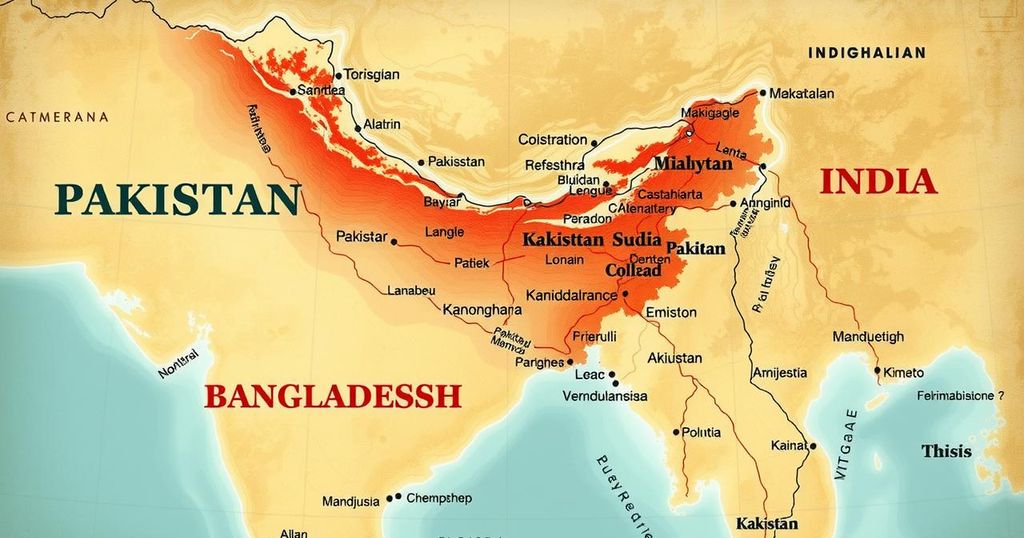Global news
' S, ASIA, AYE, AYESHA SIDDIQA, BANGLADESH, BANGLADESH NATIONALIST PARTY, BNP, COLLEGE, DELHI, DHAKA, DIPLOMACY, EAST PAKISTAN, EUROPE, FOREIGN POLICY, HAS, HASINA, HUM, HUMAYUN KABIR, INDIA, INTERNATIONAL RELATIONS, ISLAMABAD, KING ’ S COLLEGE, LONDON, MUHAMMAD YUNUS, PAKISTAN, SHE, SHEIKH HASINA, UNITED KINGDOM
Jamal Walker
0 Comments
Diplomatic Thaw: Bangladesh and Pakistan Forge New Ties Amid Regional Tensions
Political changes in Bangladesh have led to a thaw in relations with Pakistan, marked by new trade agreements and military cooperation. This shift is observed with caution by India, which views the ties as a strategic counterbalance against its influence. Despite historical grievances that complicate the normalization process, economic potential may drive further collaboration between Dhaka and Islamabad.
Recent political changes in Bangladesh have altered its relationship with Pakistan, marking a significant thaw between two previously adversarial nations. Following the ousting of Prime Minister Sheikh Hasina, who had maintained a distance from Pakistan, Dhaka has begun importing rice from Islamabad for the first time in decades. Additionally, the revival of direct flights, military interactions, and simplified visa procedures indicates a shift towards improved relational dynamics between the countries.
Historically, the underlying tensions rooted in the struggle for independence in 1971 have long influenced their interactions. Although Bangladesh enjoyed cordial ties with Pakistan briefly from 2001 to 2006, these transformed due to Hasina’s policies during her lengthy administration which were largely supported by India. With Hasina’s departure, experts note a warming relationship reminiscent of neighbors returning to mutual acceptance.
India’s attentiveness regarding this warming ties is palpable, given its fraught history with Pakistan. Recently, relations between Bangladesh and India have soured, particularly in light of India’s lack of response to Bangladesh’s request to extradite Hasina to face various legal charges. The strategic shift towards Pakistan by Bangladesh is seen by some analysts as an alignment against Indian influence in the region.
Key engagements include high-level meetings between Bangladeshi and Pakistani leaders and an increase in military cooperation, including a notable Bangladeshi military delegation’s visit to Pakistan. Experts warn that reviving military connections between these two nations poses security concerns for India, especially as the Pakistani establishment attempts to reengage with Bangladeshi Islamist factions.
Amidst these developments, both nations still face contentious historical legacies from the 1971 war, making diplomatic normalization difficult. Bangladesh demands an official apology from Pakistan for wartime atrocities, but Islamabad has shown little inclination to comply. Bangladesh’s diplomats, however, caution that relations cannot progress without addressing these historical grievances.
Despite historical tensions, economic analysts suggest that there is room for growth in bilateral trade, which currently lingers below $700 million. Trade improvement could benefit both nations, particularly as Pakistan’s large population represents a substantial market for Bangladesh. Anticipated bilateral discussions may further address these economic barriers.
As Bangladesh approaches its upcoming elections, foreign policy priorities may shift again. The situation remains critical for India, which underscores the necessity of a stable and amiable Bangladesh in preserving regional peace and stability.
The evolving relationship between Bangladesh and Pakistan highlights significant geopolitical shifts influenced by recent political changes within Bangladesh. As both countries strive to overcome historical animosities, their renewed engagement may reshape regional dynamics, particularly concerning India’s interests. The future of their relations will depend heavily on addressing past grievances and fostering economic cooperation, as a stable Bangladesh remains essential for India’s strategic stability in the region.
Original Source: www.bbc.com




Post Comment